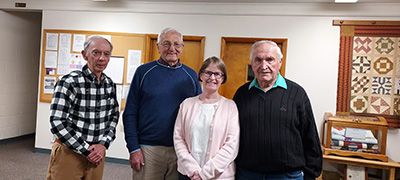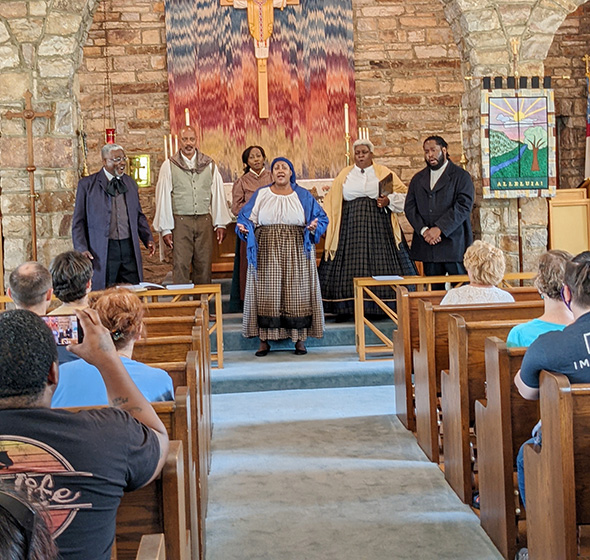The Catoctin Furnace Historical Society (CFHS) is proud to announce it has won the 2024 Award for Outstanding Stewardship of a Maryland Historical Trust Easement Property. CFHS was selected for its restoration of the Forgeman’s House, a 19th century ironworker’s home. The historic cottage, built in the winter of 1820-21, likely using enslaved labor, was owned by the furnace operation and rented to its employees.
The restoration and stabilization of the Forgeman’s House took four years and was funded by a State of Maryland General Assembly bond bill, a Maryland Heritage Areas Authority (MHAA) grant from the Maryland Historical Trust, and grants from the Tourism Council of Frederick County Tourism Reinvestment in Promotion and Product (TRIPP) and the Heart of the Civil War Heritage Area. The process included removing non-historic additions and returning the house to its original condition. CFHS tore out drywall, repointed and plastered the original stone walls and fireplace, installed a standing seam metal roof, replaced non-period windows with historically accurate reproductions, and furnished the home with antiques that showcase the simplicity of life in the 1800s.
During the restoration, CFHS uncovered more than 30,000 artifacts, including period clothing stuffed into walls as insulation. Now a living museum, the house offers overnight stays and exhibits, such as “Everyday Treasures: Bringing History to Life at the Forgeman’s House,” a collection of archaeologically derived domestic artifacts that span the homes’ 200+ year history and are a testament to the many families who called it home. Another exhibit “Under the Floorboards” features a secret chamber beneath the floor that gives visitors a glimpse into the history of the house, revealing some of the items discovered during the archaeological investigations.
The Maryland Historical Trust is presenting 11 awards recognizing outstanding preservation projects and individual leadership in honor of Preservation Month this May. The Forgeman’s House award ceremony will take place on the premises at 12525 Catoctin Furnace Road, Thurmont, Maryland 21788 on Thursday, May 2 at 11:30 am. All are welcome.
The 49th Annual Maryland Preservation Awards selected by MHT’s Board of Trustees will be livestreamed on MHT’s social media beginning on May 2 and continuing through early June. A complete list of times and locations can be found at tiny.cc/MHT-Events.
Throughout the year, the Catoctin Furnace Historical Society shares the history of ironmaking through special events. The 6th Annual Maryland Iron Festival will take place on Saturday, May 18 (10 am to 6 pm) and Sunday, May 19, 2024 (10 am to 4 pm) in the village of Catoctin Furnace, Cunningham Falls State Park, and Catoctin Mountain Park. For more information, contact info@catoctinfurnace.org or visit www.catoctinfurnace.org/events.



